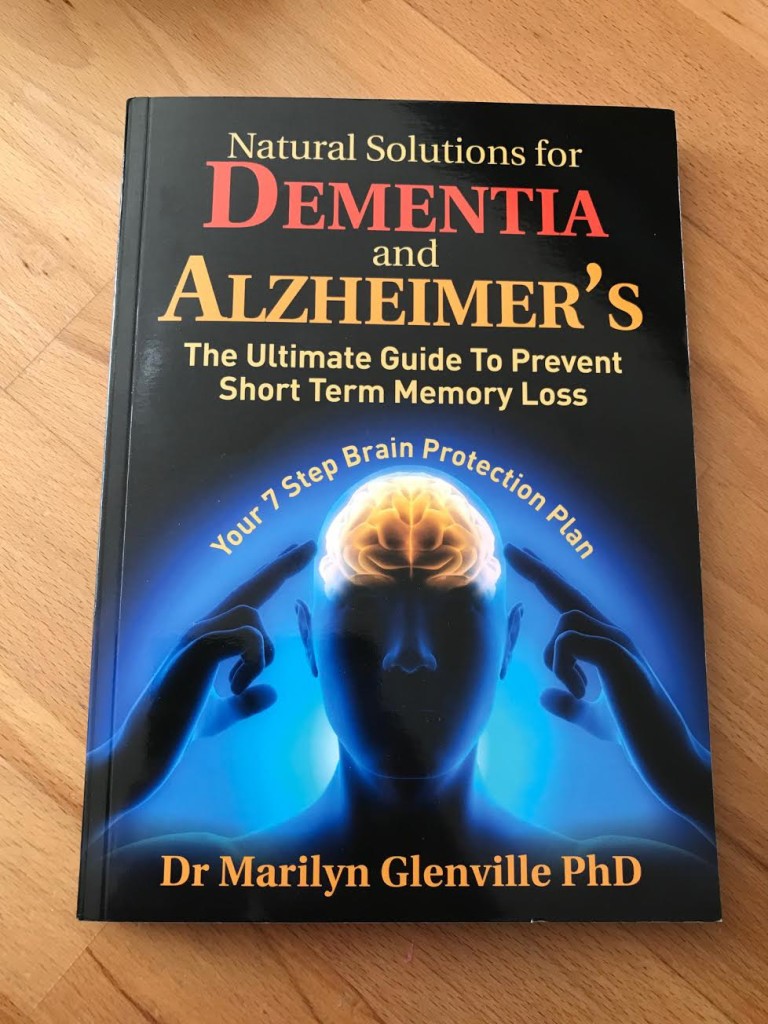Dementia affects more than 850,000 people in the UK and it is set to rise to over 1 million by 2025!*
However, not many people know that there is a strong link between sugar and Alzheimer’s. Almost 70% of people with type 2 diabetes are now known to develop Alzheimer’s, compared with only 10% of people without diabetes!

Dr Marilyn Glenville, the UK’s leading Nutritionist explains this phenomenon in her latest book Natural Solutions for Dementia and Alzheimer’s, “The high levels of insulin block a group of enzymes that would normally break down the beta-amyloid proteins responsible for the brain plaques in Alzheimer’s. Although high levels of insulincan have this effect, confusingly the brain also needs insulin for its cells to flourish and survive. Your brain has its own supply of insulin – if this supply is hampered in any way, and levels of insulin in the brain fall, brain degeneration is the result. So, as with most things in Nature, we don’t want too much or too little of something – it’s all about homeostasis; that is, balance.”
Naughty clumps
Dr Glenville explains, “It’s thought that changes in insulin function in the brain are the cause of beta-amyloid (a protein fragment) plaque build-up. Beta-amyloid itself is not a problem. In fact, it has a vital role to play in transporting cholesterol, protecting against oxidative stress, and aiding immune function. Problems occur only when the beta- amyloid proteins start to form clumps.”
Can sugar affect your memory?

As well as helping you to regulate your blood sugar, insulin regulates neurotransmitters, brain chemicals that aid learning and memory. If you become insulin resistant, not only will your body struggle to control its blood sugar, but your neurotransmitters will be unable to function as normal, with fallout for your brain function. Dr Glenville adds, “Studies showing the effects of insulin resistance on the brain support the importance of reducing sugar in your diet and show that just having higher levels of sugar (glucose) from eating too much sugary food is a risk factor for dementia even if you don’t have diabetes.”
In fact sugar’s impact on the brain goes beyond the effects of insulin. Dr Glenville says, “Being on the blood-sugar roller coaster also increases levels of the stress hormone cortisol, and this, over time, increases inflammation in the brain, speeding up the deterioration of brain and memory function.”
To keep your brain healthy and young for as long as possible we’ve asked Dr Glenville to share with us her 12 step program to quit sugar:

Spring clean your cupboards. Clear out temptation. Biscuits, chocolates and sweets are all for the local food bank. And remember that you’ll find sugar in savoury foods, too – pasta sauces, soups, ketchup, breakfast cereals and many more are all culprits. If you have a sweet tooth, the hidden sugars in savoury foods will be easiest to give up first. Replace them with your own homemade salad dressings, pasta sauces, soups, granola and so on. Grit your teeth and be ruthless with those cupboard stocks.
Stop adding sugar to drinks and food. You may be doing this on autopilot, the way some people salt their food before tasting it. If you still take sugar in tea or coffee, for example, wean yourself off it half a teaspoon at a time. If you sprinkle sugar on your pancakes or cereal in the morning, try a handful of fresh berries instead. Your taste buds will adapt surprisingly quickly.
Read the labels as you shop. Every 4g of sugar per ‘serving size’ is 1 teaspoon of sugar. The NHS says that added sugar can comprise up to 5 per cent of your daily calorie intake – that’s 30g (7 teaspoons) a day. The World Health Organisation (WHO) wants to limit added sugar (including honey) to just 6 teaspoons a day. I say to keep it as low as possible – no added sugar should be the ideal 80 per cent of the time, and then the other 20 per cent on special treats at special times won’t matter.
Use your scales. It’s important to know what the manufacturer’s assumed serving size is compared with what you would serve yourself. For example, a 30g serving of cereal may be much smaller than you would typically eat – but if it already contains 11g sugar, how much would your own bowl contain?
Don’t skip breakfast. Skipping breakfast makes you far more likely to reach for a coffee and a cake at 11am because your blood sugar will have plummeted. You may feel moody, irritable, tense and not able to concentrate. Always eat breakfast and make it a mixture of protein and carbohydrate – avoiding sugar-laden breakfast cereals at all times!
Try a bowl of porridge sprinkled with ground nuts and seeds. The porridge oats give sustained energy and the nuts and seeds add protein to help further lower the GI.
Or, have an egg on wholemeal or rye toast with grilled tomatoes. This very low-GI breakfast provides a good amount of protein from the egg whites, omega 3 fats in the yolks, and good-quality complex, unrefined carbs from the bread – all in all a power-breakfast of energy that will sustain you until your healthy mid- morning snack.
Eat little and often. So, you get to 3pm and you feel sluggish and tired and every part of your body is screaming to have something sweet to keep you going until teatime. Think about how you’ve eaten over the course of the day – did you have breakfast? Did you allow yourself a handful of nuts mid-morning? Did you eat lunch? Eating little and often is the best way to avoid blood sugar dips that lead to cravings – usually for sweet things.
Avoid extreme diets … at least while you are trying to adapt to a no-sugar regime. This is because fasting will make it harder to avoid blood sugar dips and the cravings that come with them. Once you’ve cut sugar from your diet as much as you can, you’ll even find that you may lose weight naturally, which will remove the need for dieting altogether.
Watch out for caffeine. This stimulant and can trigger a roller coaster of stress hormones that feel a bit like sugar highs and lows. Even though it may feel like an appetite suppressant, in the end caffeine will boost your appetite and trigger sugar cravings. It’s all about removing the temptation to reach for the biscuits.
Say no to alcohol. Alcohol has an effect on your blood sugar, so look for drinks with lower sugar content. Spirits do not contain sugar, but their mixers usually do. White wine is more sugary than red, but on the other hand a white wine spritzer (made with sparkling mineral water) will be better for you than a full glass of red wine.
Add protein to starchy carbohydrates. If you eating starchy carbohydrates (pasta, rice, potatoes, bread) particularly if they refined remember that they are broken down into sugar – but protein (fish, eggs, cheese, nuts, seeds and so on) slows down the rate at which your stomach empties the food into the next part of the digestive tract and so it slows down the emptying of the carbohydrate, too. Add ground nuts and seeds to porridge for vegetable protein, or an omelette (animal protein) with brown rice.
Be kind to yourself. Live by the 80/20 rule: as long as you are eating healthily and avoiding sugar 80 per cent of the time you can have that occasional piece of cake without beating yourself up about it. This will also make it less likely you’ll obsess about sugar – and fall off the wagon altogether. You’re ‘allowed’ to have sugar 20 per cent of the time, so what’s the big deal?
Be smart about alternatives. Beware ‘natural’ sweeteners – some may be no better for you than sugar itself. The following, though, are all worth trying: maple syrup, barley malt syrup, brown rice syrup and coconut sugar.
*https://www.alzheimers.org.uk/info/20027/news_and_media/541/facts_for_the_media








